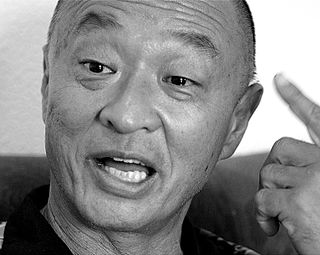A Quote by Helen Dunmore
I have learned so much from working with other poets, travelling and reading with them, spending days discussing poems in progress. There is the sense that we are all, as writers, part of something which is more powerful than any of us.
Related Quotes
I do believe that one's writing life needs to be kept separate from Po-Biz. Personally, I deal with this by not attending too many poetry readings, primarily reading dead poets or poems in translation, reading Poets & Writers only once for grant/contest information before I quickly dispose of it, and not reading Poetry Daily. Ever.
I personally believe the role of poets as poets (which is something different from our obligations as citizens, community members, humans) is to write poems. I believe this because I am quite sure poetry can do something no other form or writing, or human activity, can, at least not in such a powerful and distilled and undeniable way. And that we need this type of thinking for our survival as individuals and as a species.
I hope any poem I've ever written could stand on its own and not need to be a part of biography, critical theory or cultural studies. I don't want to give a poetry reading and have to provide the story behind the poem in order for it to make sense to an audience. I certainly don't want the poem to require a critical intermediary - a "spokescritic." I want my poems to be independently meaningful moments of power for a good reader. And that's the expectation I initially bring to other poets' writing.
Fishermen, hunters, woodchoppers, and others, spending their lives in the fields and woods, in a peculiar sense a part of Nature themselves, are often in a more favorable mood for observing her, in the intervals of their pursuits, than philosophers or poets even, who approach her with expectation. She is not afraid to exhibit herself to them.
As for the differences between audio and the printed page, the sonic aspects of poetry are important to me. I read my poems aloud to myself as I'm composing them. And I enjoy reading to an audience. I think people get tone more easily when they hear a writer read her work. Some people have told me they hear more humor in my poems at a live reading than when they see them on the page. I think that may be a matter of pacing. On the other hand, I've listened to a lot of poetry readings and I know how much you can miss. If you stop to really register one line, you miss the next three or so.
In general, I would think that at present prose writers are much in advance of the poets. In the old days, I read more poetry than prose, but now it is in prose where you find things being put together well, where there is great ambition, and equal talent. Poets have gotten so careless, it is a disgrace. You can’t pick up a page. All the words slide off.
When you spend so much time away from home, travelling around doing things like this, talking about yourself too much, which is often very painful... So, to actually come home and just be amongst people who know you extremely well, who you can't pretend to be anything other than yourself in front of, is a relief really. It gives you a sense of who you are again. You just don't get any time at home... it's such an existence of feeling very unsettled and travelling around. It's great.
These are crystalline - oftentimes incandescent - translations of Juarroz's powerful metaphysical poems where eternity and silence jut up against a world where “writing infects the landscape” and there are “more letters than leaves” - The kind of match one hopes for where both the translator and the poet are in luck; new poems which don't leak and yet old poems in which the original passion shines.
It was not the goal that really concerned us, the journey was the thing. Who ever reaches any goal? From what journey can we return? We know of the poverty about us, of the work and worry, but we know of a degree of freedom, of a stunted beauty. We have warm open days and sunshine in Carolina. Much is denied us. But we have, we have. And an attitude is more powerful than any circumstance.







































